

Eurodoc. Eurodoc is a European federation of national associations of young researchers currently undertaking their doctorate (PhD, doctoral candidates or early-stage researchers) or PhD holders in their first years of their post-doctoral research career (mostly postdoctoral researchers, postdocs, employed on a temporary basis).
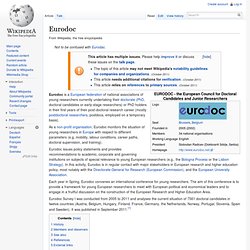
As a non-profit organisation, Eurodoc monitors the situation of young researchers in Europe with respect to different parameters (e.g. mobility, labour conditions, career paths, doctoral supervision, and training). Each year in Spring, Eurodoc convenes an international conference for young researchers. National Academic Recognition Information Centre. All EU and EEA states and all the associated countries in Central and Eastern Europe and Cyprus have a designated National Academic Recognition Information Centre (NARIC), which provides a way to compare academic qualifications as part of the Bologna Process.
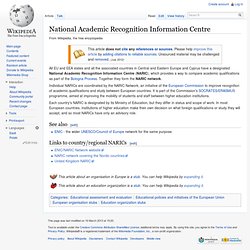
Together they form the NARIC network. Individual NARICs are coordinated by the NARIC Network, an initiative of the European Commission to improve recognition of academic qualifications and study between European countries. It is part of the Commission's SOCRATES/ERASMUS programme, aimed at improving the mobility of students and staff between higher education institutions. Each country's NARIC is designated by its Ministry of Education, but they differ in status and scope of work. In most European countries, institutions of higher education make their own decision on what foreign qualifications or study they will accept, and so most NARICs have only an advisory role.
See also[edit] Links to country/regional NARICs[edit] European Network of Information Centres. The European Network of Information Centres (ENIC) were established as a join initiative of UNESCO and the Council of Europe.
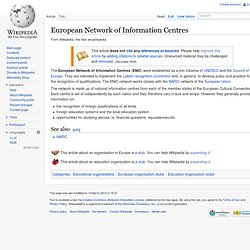
They are intended to implement the Lisbon recognition convention and, in general, to develop policy and practice for the recognition of qualifications. The ENIC network works closely with the NARIC network of the European Union. The network is made up of national information centres from each of the member states of the European Cultural Convention. Each centre is set of independently by each nation and they therefore vary in size and scope. However they generally provide information on: the recognition of foreign qualifications of all kindsforeign education systems and the local education systemopportunities for studying abroad i.e. financial questions, equivalences etc.NARIC. European Association for Quality Assurance in Higher Education. The European Association for Quality Assurance in Higher Education (ENQA) came into being in 2000 as the European Network for Quality Assurance in Higher Education.
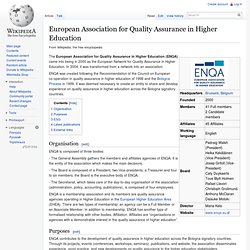
In 2004, it was transformed from a network into an association. ENQA was created following the Recommendation of the Council on European co-operation in quality assurance in higher education of 1998 and the Bologna Process in 1999. It was deemed necessary to create an entity to share and develop experience on quality assurance in higher education across the Bologna signatory countries. European University Association. EUA is the result of a merger between the Association of European Universities (CRE) and the Confederation of European Union Rectors' Conferences.
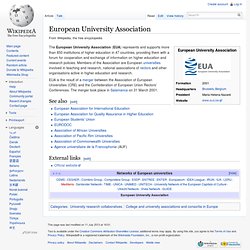
The merger took place in Salamanca on 31 March 2001. See also[edit] External links[edit] Official website. European Students' Union. The European Students' Union (ESU) is the umbrella organisation of 47 national unions of students from 39 countries and through these members represents over 13,5 million students.
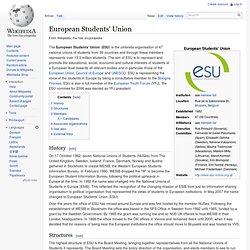
The aim of ESU is to represent and promote the educational, social, economic and cultural interests of students at a European level towards all relevant bodies and in particular those of the European Union, Council of Europe and UNESCO. ESU is representing the voice of the students in Europe by being a consultative member to the Bologna Process.
ESU is also a full member of the European Youth Forum (YFJ), the ESU nominee for 2006 was elected as YFJ president. History[edit] On 17 October 1982, seven National Unions of Students (NUSes) from The United Kingdom, Sweden, Iceland, France, Denmark, Norway and Austria gathered in Stockholm to create WESIB, the Western European Students Information Bureau. Magna Charta Universitatum. The Magna Charta Universitatum is a document to celebrate university traditions and encourage bonds amongst European universities, though it also serves as a universal inspiration and is open to universities throughout the world.
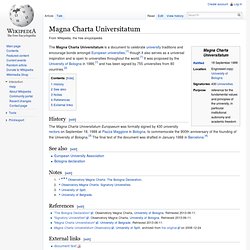
It was proposed by the University of Bologna in 1986, and has been signed by 755 universities from 80 countries. History[edit] See also[edit] Notes[edit] References[edit] External links[edit] Bologna declaration. The Bologna declaration (in full, Joint declaration of the European Ministers of Education convened in Bologna on 19 June 1999 [1]) is the main guiding document of the Bologna process.
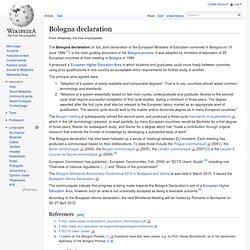
It was adopted by ministers of education of 29 European countries at their meeting in Bologna in 1999. It proposed a European Higher Education Area in which students and graduates could move freely between countries, using prior qualifications in one country as acceptable entry requirements for further study in another. The principal aims agreed were: "Adoption of a system of easily readable and comparable degrees".
That is to say, countries should adopt common terminology and standards"Adoption of a system essentially based on two main cycles, undergraduate and graduate. The Bologna declaration has later been followed up a series of meetings between EU ministers. Lisbon Recognition Convention. The Lisbon Recognition Convention, officially the Convention on the Recognition of Qualifications concerning Higher Education in the European Region is an international convention of the Council of Europe elaborated together with the UNESCO.
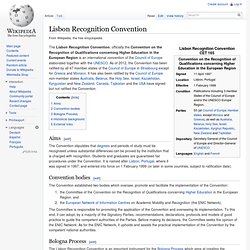
As of 2012, the Convention has been ratified by all 47 member states of the Council of Europe in Strasbourg except for Greece and Monaco. It has also been ratified by the Council of Europe non-member states Australia, Belarus, the Holy See, Israel, Kazakhstan, Kyrgyzstan and New Zealand. Canada, Tajikistan and the USA have signed but not ratified the Convention.
Aims[edit] The Convention stipulates that degrees and periods of study must be recognised unless substantial differences can be proved by the institution that is charged with recognition. Convention bodies[edit] European Higher Education Area. The European Higher Education Area (EHEA) was launched along with the Bologna Process' decade anniversary, in March 2010, during the Budapest-Vienna Ministerial Conference.
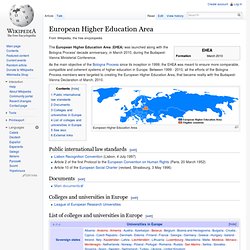
Bologna Process.